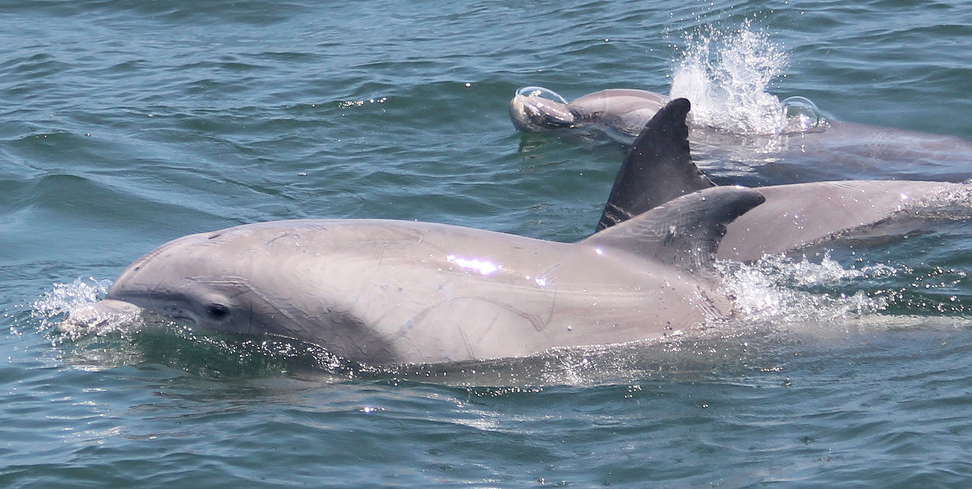Why Dolphins Have Blurry Vision Under Water

If you have ever been on a tour with the Cape May Whale Watch and Research Center, you have heard your naturalist explain that dolphins are mammals. They may swim and look like a fish, but they are not fish. Mammals have hair; they are endothermic; they produce milk for their young.
However, there is one more characteristic that holds true. A dolphin is a not a fish for all of those reasons above, but another characteristic not listed is the dolphin’s eyesight. Oftentimes on a dolphin watch, one of the bottlenose dolphins will cruise by with its melon above water level. We are physically able to see their black eyes; and we know that those mammals are looking back at us with almost the same scope. Although these animals spend their lives submerged in water, their eyesight is best out of the water. When not submerged, a dolphin and a human have a very similar sense of vision. Underneath the water, a dolphin has a blurred sense of sight like humans do. That is why their extra sense, echolocation, is so important for these mammals.
It struck me odd that an animal that spends their life in the ocean would have lacking eyesight under the water. It makes sense for humans, because humans are not evolved to spend large amounts of time underwater. It’s the same way that our hair is not aerodynamic, and our lungs are weaker than our marine mammals. So, why do these dolphins not have better eyesight in their natural habitat?
The answer lies in the evolutionary course that not just dolphins and humans have taken, but life everywhere has evolved from. The very beginning of life began with bacteria; the bacteria that could sense light was the bacteria that survived on went on the multiply. Fast forward a few million years and life has bloomed into a vast array of different sea creatures; each generation with a slightly enhanced sense of vision until a masterfully crafter aquatic eye was formed. Fish in our oceans today that depend upon light to survive have eyes that have been evolving as long as life itself has existed.
However, when life first ventured out onto land, it was not helpful at all that these creatures were equipped with eyes perfect for life underwater. Their sense of vision on land was atrocious; and evolution could not backspace on itself. Just because life was on land now, did not erase that it had been submerged for most of it existence. After that, every species that stayed on land were adapting away from the aquatic eye into a more sensible eye for land dwelling. The human eye itself is the product of millions of years of evolution away from the aquatic eye.

CMWWRC Database – 2013
Remember, dolphins are mammals. Dolphins are not fish. The ancestors of both dolphins and whales were not always aquatic. Scientists believe that dolphins have evolved from an Eocene-era mammal called a Mesonyx. This was a four-legged mammal that slept on land but swam and hunted in open waters. So, dolphins have an interesting ancestry; they evolved from a species that eventually returned to the sea.
Now, dolphins are sea dwellers; but their ancestors were not. They are not fish. Dolphins are mammals, and as mammals, they have lungs. They have hair. And fascinatingly enough, their eyes have not yet adapted back to the perfected aquatic eye. Instead, they have picked up another sense, their echolocation, that helps them “see” better underwater. Their eyes may never be as adapted to the water as the aquatic eye that fish have; however, we have no way of knowing which direction evolution will take our marine mammals in the future.
-Morgan Costello
Intern at Cape May Whale Watch and Research Center, Stockton University
